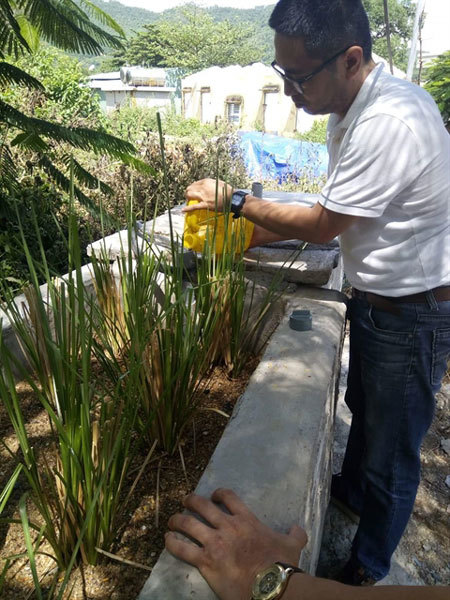
The system, which was developed on a small scale at the dump in 2018, would be applied to other dumps in the city and neighbouring provinces as well as polluted lakes and sewage systems.
Head of the research team Tran Minh Thao said the sample was designed to treat 200 litres of waste water that leaks from the dump each day, and at least 90 per cent of the waste was completely cleaned by the grass system and other biological solutions before being safely discharged.
“We have been testing the system before the city approves its deployment. The system is a non-toxic chemical treatment, while the grass roots act as a natural filter of pollutants in the waste,” Thao said.
“Four square metres of vetiver grass could soak up 200 litres of polluted waste and discharge it each day. It also helps clear bad odours, while reducing sludge after treatment,” he explained.
He said the vetiver grass-based system could be used to clean 750cu.m with an investment of VND50 billion (US$2.2 million) – half that of a chemical-based treatment system – and the system costs only VND50,000 ($2.1) to clean 1cu.m of polluted waste.
Thao said the group has been testing the vetiver grass-based system and biological solutions at some polluted lakes in the city and Quang Nam Province.
The biological sewage treatment model was used to filter 10cu.m of toxic sewage from the college’s laboratory each day from 2014, and over 90 per cent of heavy metals contained in the sewage dissolved in the process.
He said continuous tests of the grass system on wastewater treatment were carried out by the group daily from 2014.
The central city plans to build the first solid waste treatment complex project on a 100ha area in Hoa Vang District with total investment of VND138 billion ($6.13 million) in the first stage later this year. The complex will include a dump leakage treatment plant, waste recycling, and waste-to-energy system.
Khanh Son dump, 20km west of the city, receives an amount of 1,200 tonnes of waste each day, and the dump releases 700cu.m of untreated wastewater daily.
According to a report from the Vietnam Vetiver Network, over 40 provinces and cities have been planting vetiver grass to deal with water and soil pollution, desertification, erosion and stabilising river banks and sea dykes.
Geologist Tran Tan Van, director of the Vietnam Vetiver Network, said the vetiver grass has been used to protect highway dykes, cover waste dumps at coal mines, and on dioxin-contaminated soil.

 Previous page
Previous page Back to top
Back to top







